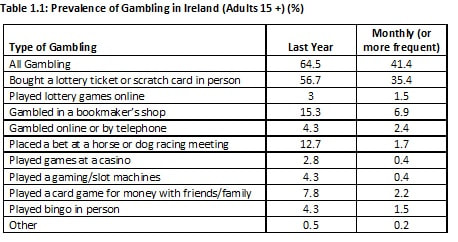This post is possibly opportune given the week that is in it. The end of last month saw the release of a survey on gambling prevalence by the Department of Health in Ireland (press release here, report here). It is part of a wider survey on the Prevalence of Drug Use and Gambling in Ireland and Northern Ireland. While the survey has been carried out at regular 4-yearly intervals since 2002, the most recent survey was the first to capture detailed information regarding gambling habits in Ireland. The survey sampled a representative number of people aged 15+ from August 2014 to August 2015, resulting in a sample of 7,005 respondents, a response rate of 61%.
The definition of gambling used in the survey was a broad one and included buying a national lottery ticket or scratch card, playing lottery games online, gambling in a bookmaker’s shop, gambling online or by telephone, placing a bet at a horse or dog race meeting, playing games at a casino, playing a gaming/slot machine, playing card games for money with friends/family and playing bingo. Table 1.1 reports the prevalence of gambling in Ireland where prevalence refers to the proportion of the adult population (15+) who have gambled in a particular time period (i.e. last year or last month). The table is reproduced below.
Table 2 in the report breaks down the figures on last year gambling by age. Overall gambling prevalence appears to increase with age with higher proportions in the 35-44, 45-54 and 55-64 age categories. The effect is non-linear however as it decreases for those aged 65+. In general, older people are more likely to buy national lottery tickets while younger people gamble in a bookmakers shop, at race meetings and online.
Table 4.1 and 4.2 separates last year prevalence by gender. In terms of all gambling activities, prevalence for males was slightly higher than females across all age groups except interestingly, in the 65+ age category. When broken down by the gambling activities, females gamble on the national lottery or play bingo to a greater extent while males gamble in a bookmakers shop, at race meetings and online. When looking at more frequent (monthly or more frequently) gambling (Tables 5.1. and 5.2), the figures are weighted significantly more towards males, that is, males engage in all forms of gambling on a more frequent basis than females and also across the different forms of gambling. In fact the only frequent forms of gambling than females really engage in is buying national lottery tickets.
Males also spend larger amounts on gambling than females, with high spending defined as spending more than €250 on gambling in the last year (Tables 6.1 and 6.2). The prevalence of high spending on gambling across all adults is greatest for the national lottery (11.2%), gambling in a bookmakers shop (4.9%), gambling at a race meeting (1.8%) and online or telephone (1.4%). The equivalent figures for males are 12.9%, 9.5%, 3.4%, 2.9% respectively.
Table 7 reports gambling prevalence by socio-economic group. Some interesting patterns are present here. Taking all forms of gambling initially, the report finds that higher socio-economic groups gambling more prevalently, a probable income effect. This effect is also present for most of the gambling activities particularly gambling online and placing bets at race meetings (the latter of which, interestingly, displays a very strong positive socio-economic effect). There is a weaker positive effect for playing the national lottery (i.e. effectively similar levels of prevalence across all socio-economic groups) and a strong negative socio-economic effect for gambling in a bookmakers shop.
Finally figures for the prevalence of problem gambling were also reported. Perhaps unsurprisingly, males are found to have a higher prevalence of problem gambling than females (1.4% vs. 0.2%) with problem gambling most common in young males (2.9% in the 25-34 age group).
So what can be taken from the survey? Generally the results are as expected. Males gamble more than females. Older people play the national lottery, younger people gamble in bookmakers, at race meetings and online. Males are more likely to be problem gamblers. One thing that I think is interesting to see, is the fact that the ‘traditional’ ways of gambling are still the ones that are the most popular. I would have expected larger values for online gambling for example but this did not arise.
Couple of points on this however, which are relevant for the rest of the results also. The survey was undertaken almost 4 years ago and even since then, one would expect online gambling to have increased. It is also hard to judge the values when there is no comparison with previous surveys i.e. no trend. It could be the case that online gambling, while low, is trending upwards and the traditional forms of gambling are trending downwards. Finally, as is the case with all gambling surveys, the level of non-reporting of gambling can be high because people may not want to report their gambling habits truthfully and they may also subconsciously tend to underestimate how frequently the engage in the activity and how much they spend. Not so much as problem with Robbie Butler however, as we will see over the coming days!

 RSS Feed
RSS Feed